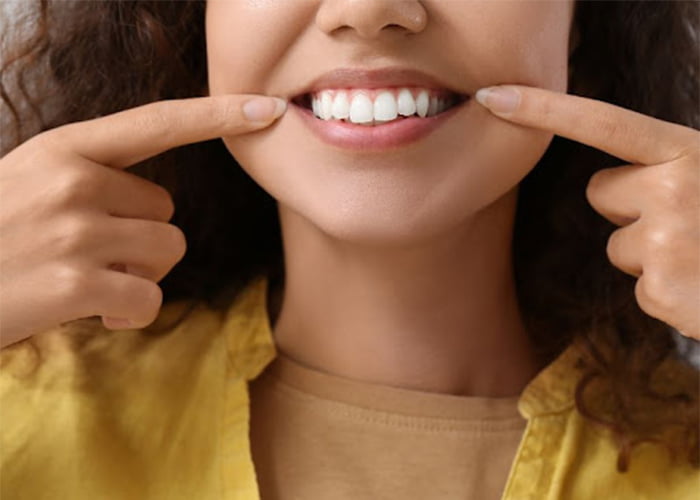Read on to discover the truth about teeth whitening and its effects on enamel. Find out does teeth whitening damage enamel is true or not.
This article provides an in-depth look at the effects of teeth whitening on enamel and discusses the various factors that can contribute to enamel damage. By examining the latest research and expert opinions, this articale aims to provide readers with a clear understanding of the relationship between teeth whitening and enamel damage. Whether you’re considering teeth whitening or just curious about the topic, “Do teeth whitening damage enamel” is a must-know for anyone seeking accurate information on this important issue.
What is Professional Teeth Whitening?
Professional teeth whitening is a cosmetic dental procedure performed by a dentist or dental professional to remove stains and discoloration from teeth, resulting in a brighter, more attractive smile.
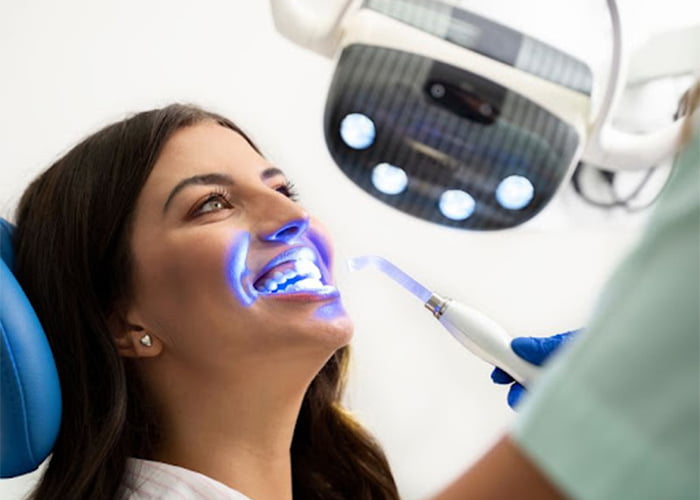
The process usually involves the use of a whitening agent, typically hydrogen peroxide or carbamide peroxide, which is applied to the teeth in a controlled and safe manner. The whitening agent works by breaking down the chemical bonds between the molecules that cause staining, effectively bleaching the teeth and making them appear whiter.
See more: Teeth whitening at-home remedies
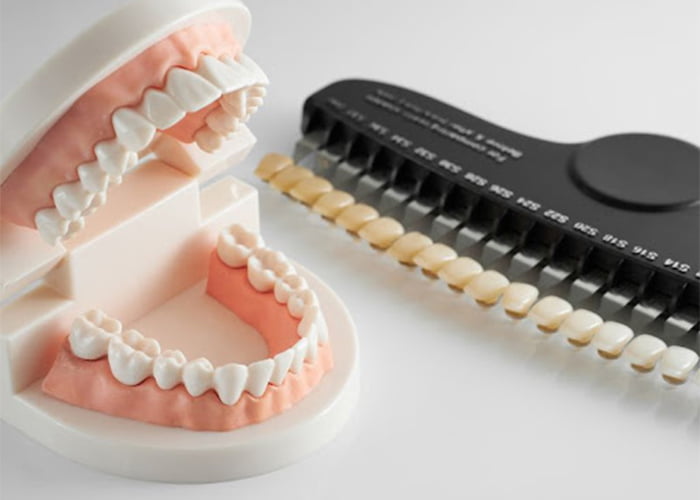
Professional teeth whitening is usually performed in a dental office, but some dentists may also provide custom-made whitening trays and take-home whitening kits for their patients to use at home. The treatment can be tailored to the individual patient’s needs and desired level of whitening.
Does Teeth Whitening Damage Gums?
Teeth whitening can cause temporary sensitivity and irritation to the gums, but it generally does not cause long-term damage when performed by a dental professional.
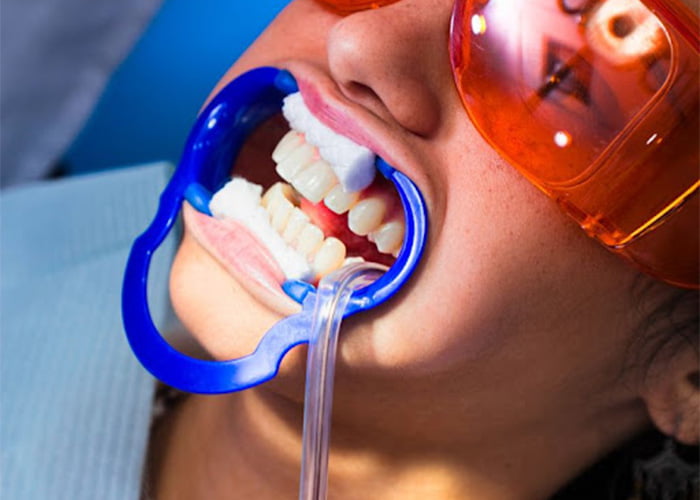
During a professional teeth whitening procedure, a protective barrier is usually placed over the gums to prevent the whitening agent from coming into direct contact with them. This helps to minimize the risk of gum irritation and sensitivity.
However, it is possible for teeth whitening to cause gum recession due to the whitening agents in the gel (the peroxide) can irritate your gums. The peroxide acts in a similar way to bleach, and if it gets onto your gums, you’ll feel a burning sensation. If a person uses an over-the-counter whitening product or does not follow the instructions provided by their dentist, they may be at greater risk of experiencing gum damage or irritation. Overuse or improper use of whitening products can cause the gums to become inflamed or even burned, leading to discomfort and potential damage.
Over-the-counter whitening products can lead to gum damage
See more: Benefits of Keeping Wisdom Teeth
Does teeth whitening damage enamel?
When performed correctly by a dental professional, teeth whitening is generally considered safe and does not cause permanent damage to the enamel.
The active ingredients in teeth whitening products, such as hydrogen peroxide or carbamide peroxide, work by breaking down the chemical bonds that cause staining on the teeth. While these ingredients can cause temporary tooth sensitivity and some degree of enamel erosion, when used in appropriate concentrations and for a limited amount of time, the damage is usually minimal and temporary.
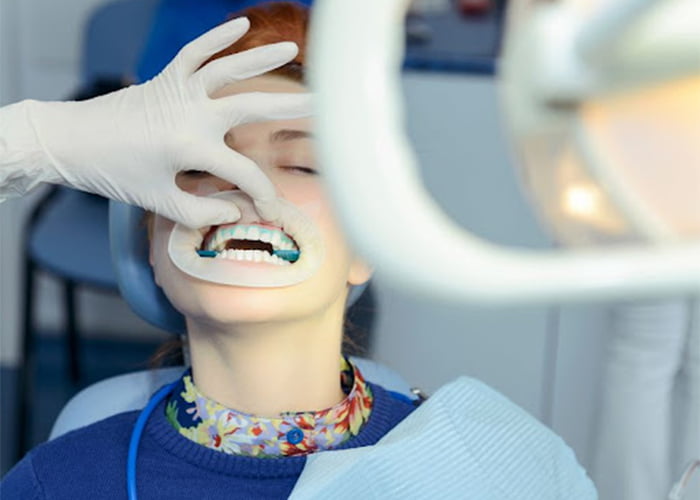
However, overuse or misuse of teeth whitening products, particularly those purchased over the counter, can lead to excessive enamel erosion and permanent damage. It is important to follow the instructions provided by a dental professional and not to use whitening products excessively or for prolonged periods of time.
The Side effects of teeth whitening
Teeth whitening can have some side effects, although most of them are temporary and mild. The following are some of the common side effects associated with teeth whitening:
- Tooth sensitivity: Whitening products can temporarily make teeth more sensitive to hot, cold, sweet, or sour stimuli. This sensitivity usually disappears within a few days of completing the treatment.
- Gum irritation: Whitening products can sometimes irritate the gums, causing them to become red, swollen, or sore. This usually resolves on its own within a few days.
- Enamel erosion: Overuse or misuse of whitening products can lead to excessive enamel erosion, which can cause tooth sensitivity and increase the risk of cavities.
- Uneven whitening: Teeth whitening products may not whiten all teeth evenly, especially if there are existing dental restorations, such as fillings or crowns, that cannot be whitened.
- Nausea and vomiting: In some cases, swallowing a small amount of the whitening gel or solution can cause nausea and vomiting.
- Temporary discoloration: Teeth may become temporarily discolored immediately after treatment, but this usually fades within a few hours.
How Often Should You Have Your Teeth Whitened?
The frequency of teeth whitening treatments depends on several factors, including the individual’s oral hygiene habits, diet, and lifestyle choices. Generally, teeth whitening is a safe procedure when performed by a dental professional, but it is not recommended to overdo it as it can lead to enamel erosion and other side effects.
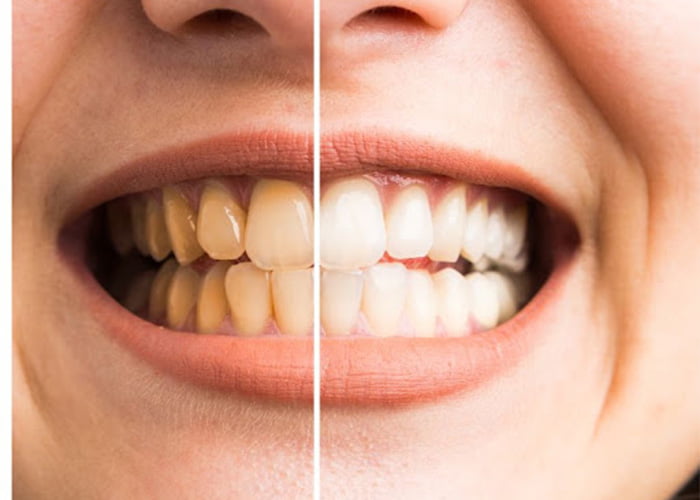
In-office professional teeth whitening treatments typically last between 1-2 years, depending on the individual’s oral hygiene habits and lifestyle choices. At-home whitening treatments may last for shorter periods of time.
It is important to follow the instructions provided by a dentist and maintain good oral hygiene habits to prevent staining and discoloration and limit the consumption of foods and beverages that can cause staining.
Is teeth whitening worth it?
The decision to whiten your teeth is a personal one and depends on your individual preferences and needs. Teeth whitening can be worth it if you are looking to improve the appearance of your smile and boost your confidence.
Teeth whitening can help remove surface stains and discoloration caused by aging, certain foods and beverages, tobacco use, and other factors. This can result in a brighter, more youthful-looking smile and can enhance your overall appearance.

How to avoid stains on your teeth
There are several ways to avoid stains on your teeth and maintain a bright, healthy-looking smile:
- Practice good oral hygiene
- Limit staining foods and beverages
- Use a straw
- Quit smoking
- Consider professional teeth cleaning
- Use teeth whitening products responsibly
By following these tips and maintaining good oral hygiene habits, you can help prevent stains on your teeth and maintain a bright, healthy-looking smile.
Cases in which teeth should not be bleached
While teeth whitening is a generally safe and effective procedure, there are certain cases where teeth should not be bleached. These include:
- Pregnancy and nursing: Women should avoid teeth whitening during pregnancy or breastfeeding due to limited safety information.
- Tooth sensitivity: People with sensitive teeth or gums should avoid or postpone teeth whitening until the sensitivity is addressed.
- Gum disease: It is important to treat existing gum disease before teeth whitening to avoid increased sensitivity.
- Tooth decay or damaged enamel: It is important to address any existing dental problems before undergoing teeth whitening to avoid further damage.
- Restorations: Consult a dental professional before undergoing teeth whitening if you have any dental restorations.
Conclusion
In conclusion, there is much debate around the potential for dose whitening teeth to damage tooth enamel. While some studies suggest that excessive or improper use of teeth whitening products can cause enamel damage, the vast majority of research suggests that when used correctly, teeth whitening is a safe and effective cosmetic dental procedure. Ultimately, the best way to ensure that your teeth are healthy and properly cared for is to consult with a dental professional before undergoing any teeth whitening treatment. With their guidance and expertise, you can safely achieve a brighter, healthier-looking.
Dentist in Marysville | Dentist For Life is a highly reputable dental practice that offers comprehensive dental care services to patients of all ages. With a team of highly trained and experienced dentists, the practice is committed to providing the highest quality dental care to patients in Marysville and the surrounding areas. From routine checkups and cleanings to complex restorative procedures, the dentists at Dentist For Life are dedicated to providing that their patients achieve optimal oral health and a beautiful, confident smile. With state-of-the-art technology, a comfortable and relaxing environment, and a commitment to patient satisfaction, Dentist in Marysville | Dentist For Life is the go-to dental practice for all your dental needs.

